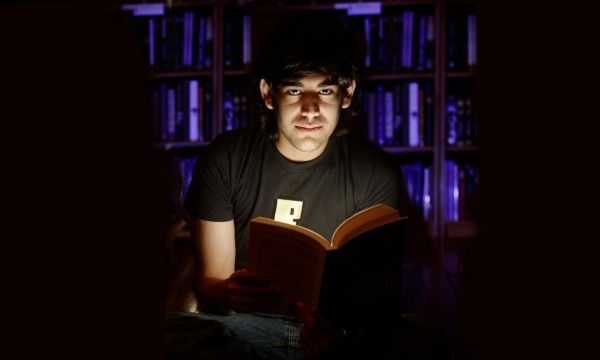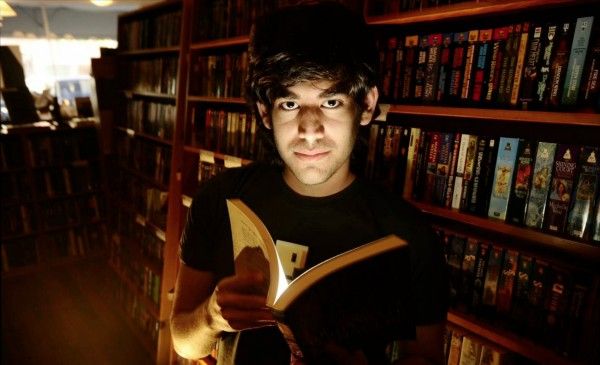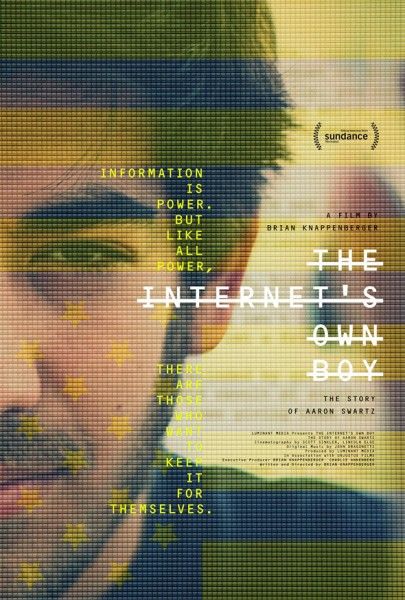We live in a digital age, but in the grand scheme of things, the Internet is in its infancy. It’s still relatively new territory where a massive trove of information is at our fingertips, and the world is trying its hardest to catch up. Aaron Swartz understood that the Internet might not just be a way for us to watch cat videos while waiting for a movie to start; its wealth of knowledge has the power to literally change the world. In director Brian Knappenberger’s illuminating, infuriating, and ultimately heartbreaking documentary The Internet’s Own Boy: The Story of Aaron Swartz, we’re given a look at the life of a young prodigy who put his immense talent to use trying to enact real social and political change.
The film also explores how, in the ever-changing digital age, the government’s desire to “make an example” of Swartz had dire consequences that almost certainly deprived us of further good from this brilliant mind. Read my full review after the jump.
Aaron Swartz was always sharp. The Internet’s Own Boy opens by showing home video footage of Swartz as a child, and his parents recount how he was able read by age 3. He had a thirst for knowledge and sharing information, and would often come home from school and teach his brothers what he had learned that day just for fun. By age 14, Aaron was serving on the RDF Core working group to help develop the very first RSS; his colleagues were impressed by his knowledge through email correspondence even before they found out he was just a teenager.
In Swartz’s late teens and early twenties, he assumed the role of entrepreneur, as he founded or co-founded a number of websites and organizations, eventually becoming one of the principal developers of Reddit. When Reddit was acquired by the owners of Wired magazine, Swartz was forced to move to Silicon Valley and take up a droll office position. This didn’t sit well with Swartz’s ambitious spirit, nor did the atmosphere of Silicon Valley gel with his increasingly political focus. He eventually parted ways with his Reddit co-founders in what was described as a “messy divorce” that found Swartz formally fired for refusing to show up for work.
Swartz continued to found and develop numerous startups or groups, and following a brief run-in with the FBI for pulling court documents from the pay court record system PACER, Swartz encountered serious trouble. After finding a supply closet open at MIT, Swartz accessed the university’s database and began pulling “an extraordinary volume” of articles from the scholarly database JSTOR; free to university students, these articles contained basically all published human knowledge dating back to Enlightenment, and access cost a small fortune to the general public. Swartz was eventually discovered by the authorities and subsequently arrested by the MIT police, and he also came under the eye of the United States Secret Service.
What followed was a maddening attack on Swartz by the government, and he was indicted on 13 felonies that carried a maximum penalty of a $1 million fine and up to 25 years in jail. The government decided to make an example of Swartz, whose crime was not murdering, physically harming, or stealing money from anyone, but simply pulling academic knowledge from a database of computers that was already available to MIT students free of charge. A clear motive for Swartz’s hacking was never fully understood, but his friends presumed that Swartz had simply planned to mine the information for data and patterns, which he had previously done with records collected from the Harvard Law Review.
Knappenberger’s documentary is always engaging, often enlightening, and ultimately tragic. All of the information and interviews included in the film feel absolutely essential to understanding Aaron Swartz’s story and the larger implications of his prosecution. In one segment, Knappenberger highlights the fight against SOPA, in which Swartz was instrumental in getting the public and Internet involved in preventing the harmful copyright bill from moving forward. We see U.S. Senators proclaiming on the floor of the Senate that they are not “nerds” and therefore do not fully understand the argument against SOPA, making yet another case for the dangers inherent in policing this new frontier called “the Internet.”
When the people in charge of making the laws see something as free and far-reaching as the Internet, they feel the need to rein it into the confines of something they can understand. In the process, we as an American public are in danger of losing civil liberties. Swartz understood this, and his passion for serious change is omnipresent in the footage we see in the film; he genuinely believes that sharing is a moral imperative.
One of Swartz’s close friends recounts a time in which they walked by the White House and Swartz commented, “they don’t let felons work there.” He aspired to make a serious difference in this world not simply by hacking or making noise on the Internet, but by entering the government system and arguing for making this a better country and, by extension, a better world from within. In a better world, he would have been afforded this opportunity.
The U.S. Government prosecuted Aaron Swartz with the full force of the law in order to make him a deterrent. This fact was admitted directly to Swartz’s defense, as the Government planned on making Swartz an example for any future hackers with intentions of…putting scholarly articles on the internet for all to see? It’s unclear just exactly why Swartz was treated so badly. It’s an absolute injustice, especially considering just how few of the men responsible for the 2008 financial crisis—an event that actually harmed hundreds of thousands of Americans—were “made an example of.” Faced with an impending brutal trial in which he was almost certainly going to jail—just so the U.S. Government could prove a point—Swartz unexpectedly and without warning took his own life at the age of 26.
Setting aside his brilliance, the simple story of Aaron Swartz’s life would be fascinating enough for a feature documentary. What makes The Internet’s Own Boy so absorbing and insightful is its focus on Swartz’s potential impact on the world. This man was a revolutionary with passionate, high-minded ideas about equality and building a better society. Why should information be restricted only to those who can afford it? Wouldn’t it be beneficial to make our world’s wealth of knowledge available to everyone free of charge? And where do our civil liberties end when it comes to the World Wide Web? Who owns the information on the Internet? These were questions that Aaron Swartz was asking with vigor, passion, and purpose, and he wouldn’t be content until he found answers.
The Internet’s Own Boy succeeds wonderfully on two levels: it chronicles the life of a young visionary that abruptly came to an unjust and heartbreaking end, and it also explores the evolving confines of the Internet with regards to civil liberties and morality. Knappenberger seamlessly weaves together these main focuses, and the result is a fascinating, frustrating, and inspiring documentary that is an absolute must-see.
Rating: A-
Click here for all of our Sundance 2014 coverage, and click on the corresponding links for my reviews:
And click on the corresponding links for Matt's reviews:
- The Babadook
- Blue Ruin
- Boyhood
- Calvary
- Cold in July
- Frank
- God’s Pocket
- The Guest
- Hellion
- Ivory Tower
- Laggies
- Lilting
- Locke
- Love Is Strange
- Whiplash
- Young Ones




